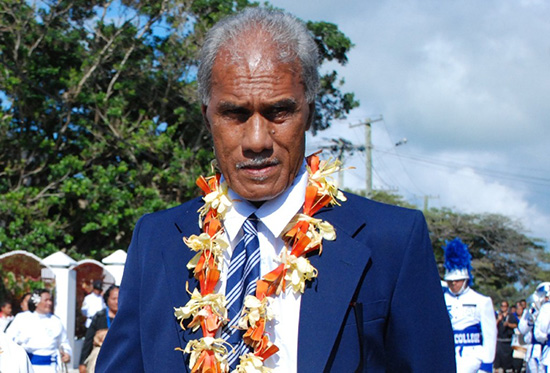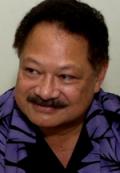
'Akilisi Pohiva’s journey from an unknown and persecuted Parliamentarian to the top of Tonga’s executive power has been long and often hazardous, yet it has been his undying resilience that finally brought him victory, writes Kalafi Moala.
ANALYSIS: After almost five weeks of political wrangling since the November 27 election, Tonga’s elected representatives finally chose a Prime Minister late last month. As expected, he is Tonga’s long time pro-democracy leader, ‘Akilisi Pohiva.
At 72, Pohiva is the oldest in Tonga’s Parliament, and is also the longest serving Member of Parliament.
By the time he finishes his current term in 2018, he would have been in Parliament continuously for 32 years.
But Pohiva’s journey from an unknown and persecuted Parliamentarian to the top of Tonga’s executive power has been long and often hazardous, yet it has been his undying resilience that finally brought him victory.
As the government’s chief critic for the past three decades, he has been dismissed wrongly and illegally from his government post as a school teacher; persecuted for his views and vocal campaign for reform; beaten up physically; sued many times for articles he has published; twice imprisoned; ridiculed and mocked as a “fool” for criticising the monarchy, the aristocracy, and the government.
In 1992, Islands Business Magazine named him together with Bishop Patelesio Finau as the Pacific “Men of the Year”; and in 2013 he was awarded the “Defender of Democracy” award from the international organisation of Parliamentarians. He has been honoured by various nations for his work as a reformer.
He believes Tonga’s monarchy is only secure in a socio-political system in which the people are the responsible governors.
Good governance
Pohiva’s message in all these years has been that corruption is the chief impediment to development, and that good governance is the solution to Tonga’s multitude of state problems.
“We acknowledge our lack of natural resources, and of human capital, but we can manage our limited resources well for the benefit of Tonga’s people if we can stop corruption,” he once told his supporters.
One of the criticisms against Pohiva is the unfounded assumption by his critics that he does not have an economic plan for the country; that he mostly talks politics yet the country is in dire need of economic development.
But he argues that building wharves, airports, roads, and an infrastructure for development will amount to little unless there is deliberate action to stamp out corruption and exercise good governance.
In answering a critic he said: “I will not be known as one who builds bridges, buildings, roads, and things like that. I’m sorry, but I’m not the one to do that. My main priority however, is to create a political framework in which every Tongan is held in equal value, and justice is served for everyone.
“If the political framework is not reformed, the economic development we are trying to bring about is like putting things into a basket full of holes.”
And it is probably why Pohiva has gone through meticulously over the months before the election to select a team consisting mostly of technocrats who could help him in every sphere of economic and social development.
Economic experts
Among them are finance and economic experts, fisheries and agricultural specialists, as well as those who have worked in tourism for years.
Why is Pohiva’s election to be Tonga’s Prime Minister of historical significance at this juncture of Tonga’s march into a full democracy?
It’s not just because he has been the founder and head of the popular Pro-democracy Movement for the past 30 years, but he holds hope for a new Tonga, a small island nation that must change pathway in every sphere of development if it is to produce different results.
The alternative choice to Pohiva was Samiu Vaipulu, the incumbent Deputy Prime Minister in Lord Tu’ivakano’s government, a government that has allegedly taken the country in the last 4 years to its worst state of corruption ever, with breakdowns in law and order, extremely high unemployment, rapid growth of poverty, and an explosive outbreak of non-communicable diseases (NCDs).
A Vaipulu government will keep Tonga on the same pathway of increasing dependencies on foreign aid, and foreign indebtedness. Under Vaipulu, things are expected to go from bad to worse.
Since the 1980s, Tonga has gone through a yo-yo period in political, economic, and social development. And by 2008/09 the impact of the world economic downturn put Tonga and its small population into an economic spiral that is still being felt.
When 59 percent of the government budget (2013/14) is from foreign aid, there is definitely something amiss in how things are being managed in the island kingdom.
‘Living beyond means’
As Pohiva has so often proclaimed: “We are living way beyond our means.”
The Tongan hierarchical structure that forms a convenient elitist system of political and economic alliance among royal family members, nobles, and business owners dominate the small and fragile island economy.
It is a situation that must change. The status quo threatens to take Tonga on a dangerous pathway to the future where the few get richer while the majority remains poorer more than ever.
The near collapse of an economic system based on foreign aid and financial remittances from Tongans overseas will negatively impact Tonga’s social system, so much so that fear of spiraling lawlessness and disregard for authority will alter the island kingdom’s social landscape for years to come.
So, there is a messianic sense in the country as Pohiva takes the reins of governance for the first time. He has to live up to his vision and message of many years.
But people cannot live on vision and on a message. They must have food on the table, get the kids through school, and afford to have running water and electricity.
Cutting costs
Pohiva promised before the election that if elected to government, he would cut the cost of electricity and water, streamline government departments to save money, cut costs in government travel, and eliminate excessive government spending alleged to have been based on corrupt practices.
He has also promised to cut Tonga’s diplomatic offices overseas that may not be functioning with any purpose for the country.
The estimate is that millions of dollars will be saved and used for services needed by the people of Tonga.
Pohiva’s new government has pledged to set apart the three ministries that deal with the productive sectors – agriculture, fisheries, and tourism.
“These three productive sectors will be the focus of our development,” he told his team of Pro-democracy representatives in Parliament. “We must focus on the things that will engage our people and benefit them in the short and long run.”
The selection to be Prime Minister did not come easy for ‘Akilisi Pohiva. In fact it was not really certain he would win until the special session of Parliament on December 29.
The secret ballot was conducted among the 26 members of Parliament. As they entered the special session, Pohiva was assured of 10 votes; Vaipulu was assured of 10 votes, if all the nobles were going to vote for him. The balance for whoever will win the majority would be dictated by six independents.
There was still a chance that one or two of the nobles would either abstain or vote for Pohiva.
Since the winner would be by a simple majority, abstaining would favour the other side.
Solidarity for Pohiva
In the meantime, Pohiva’s group was in solidarity. There was no doubt who they would be voting for.
Since the election, the most tense of political activities had to do with the “horse trading” going on, since no one group had won the outright majority.
Pohiva and his group needed 4 more votes to achieve a majority; the nobles needed 5, and the independents needed 7. It looked like the independents were to be the “power brokers”; they would be the ones to make up the numbers for whoever was to win.
At the beginning of the “horse trading” there were indications that 2 of the nobles might cross the floor to join Pohiva, who was open to the idea even though he had declared that the new government should be a government of the people – Cabinet to be made up of people’s representatives.
However, he reasoned that if bringing in 2 nobles would give them the majority, it was fine with him as long as they were committed to his party’s objective of good governance.
But none of the 9 nobles voted for Pohiva.
Secret pledge
‘Akilisi’s prospect of being elected Prime Minister was good as the 26 representatives filed into Parliament to begin the proceedings. Word had come from a meeting of the Pro-democrats and the independents on Friday evening, December 26, that five of the independents had secretly pledged support for Pohiva to be Prime Minister.
When the ballot was taken, 15 voted for Pohiva; 11 voted for his opponent, Samiu Vaipulu. It was a major victory for Pohiva.
Apparent at the special Parliament were those who were stunned by the results; they were mostly media who had got it wrong in projecting what did not happen, as well as the nobles’ representatives who seemed to have been convinced their candidate was going to win the vote to be Prime Minister.
As Prime Minister, ‘Akilisi Pohiva has to learn the realities of democracy when not one group wins the majority outright. Even though he had 10 representatives on his side, he still had to form a coalition with the independents to form a majority government. He needed only 4 more votes but he got 5.
The new ministers:
Samuela ‘Akilisi Pohiva: Prime Minister; Minister of Education; Minister for Foreign Affairs and Trade
Siaosi Sovaleni: Deputy Prime Minister; Minister of Communications; Minister for the Environment and Climate Change
Tevita Lavemaau: Minister of Revenue and Customs
‘Etuate Lavulavu: Minister for Infrastructure
Saia Piukala: Minister for Health
Poasi Tei: Minister of Public Enterprises
Pohiva Tui’onetoa: Minister for Police, Prisons and Fire; Minister of Tourism, Labour and Commerce
Semisi Fakahau: Minister of Agriculture, Food, Forestry and Fisheries
Sione Vuna Fa’otusia: Minister of Justice
‘Aisake Eke: Minister of Finance and National Planning
Fe’ao Vakata: Minister for Internal Affairs
Lord Ma’afu: Minister of Land; Minister of Natural Resources; His Majesty’s Armed Forces
This work is licensed under a Creative Commons Attribution-NonCommercial 3.0 New Zealand Licence.




